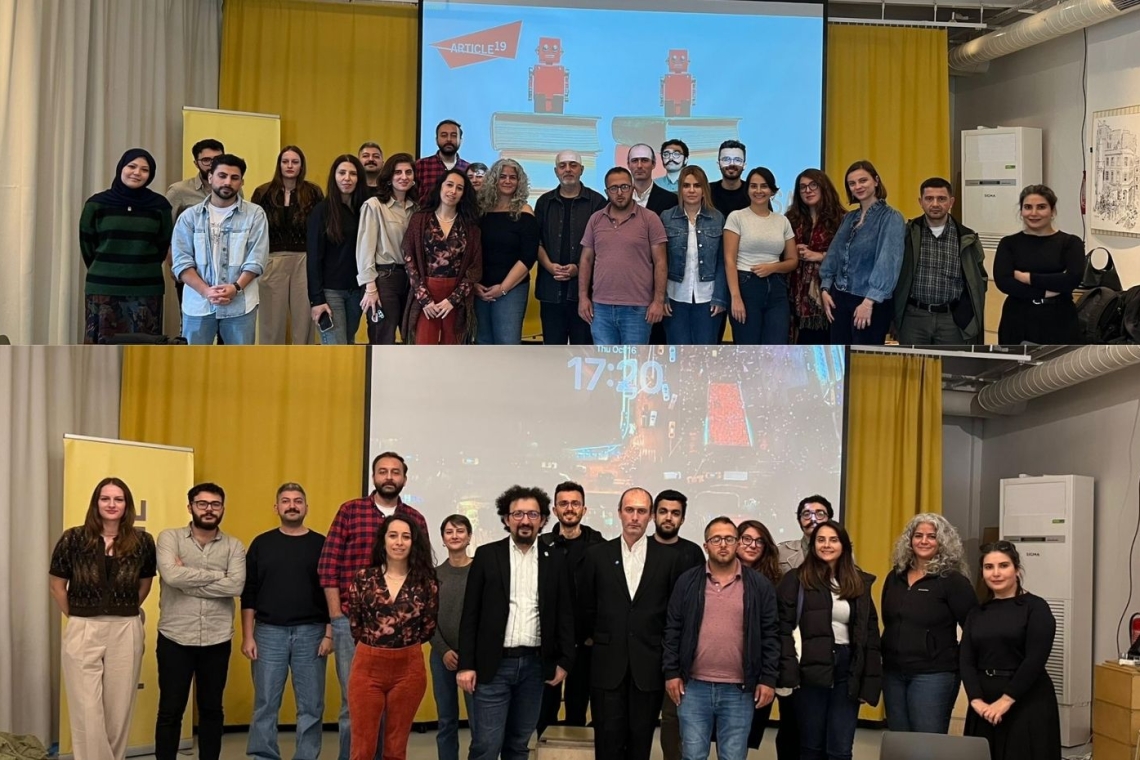HİCRAN CENGİZ
A recent workshop organized by ARTICLE 19 and the Media and Law Studies Association (MLSA) brought together journalists and civil society members to explore storytelling techniques and the use of generative artificial intelligence (AI). The event featured two sessions: “Storytelling for Journalists and Civil Society” and “Generative AI Workshop.”
In the storytelling session, journalist and author Gökçer Tahincioğlu emphasized the significance of storytelling in journalism. “What do you want to say? What’s your message?” he asked, noting that the purpose and form of storytelling should arise from the issue itself, rather than trying to attach a message to a story retroactively. Tahincioğlu argued that storytelling in journalism, particularly in the age of social media, must serve the public interest and uphold a sense of responsibility toward telling what is communal and essential.
Creating stories from stories
Referencing a discussion titled “To Tell a Story” between Susan Sontag and John Berger, Tahincioğlu explored two approaches to storytelling. While Berger focused on conveying real-life scenes plainly and faithfully, Sontag insisted that stories originate with the writer and are shaped by their narrative choices. Sontag’s approach, which emphasizes depiction and suggestion over direct exposition, challenges the industrialized and formulaic production of stories, said Tahincioğlu.
“Creating a story starts with building a structure,” he said. “You can design that structure in many ways, beginning with the writer and adding elements like the story’s universe, characters, and context. But the key to building a story is in-depth research. This applies equally to journalism and literary writing.” He added that after research, attention to detail becomes critical.
Participants in the storytelling workshop engaged in exercises on how to narrate and structure real-life situations into compelling stories.
Journalists, civil society, and generative AI
In the second part of the workshop, technology writer Ahmet Alphan Sabancı led a session on the principles and implications of generative AI. He discussed how journalists and civil society professionals can use these technologies, and assessed both their advantages and drawbacks.
Sabancı reviewed the development of generative AI tools, starting with ELIZA—a 1960s chatbot capable of providing basic psychological responses—and continuing through Clippy, Deep Blue, Siri, Alexa, and AlphaGo, leading to today’s advanced models like GPT. “The main trend today is how generative AI can reduce workload and free up time. But we still haven’t answered the core question: how should we use AI?” he said.
“We haven’t yet answered how we should use AI”
Explaining how generative AI models work, Sabancı said, “It all comes down to a mathematical process we call learning. The model converts input into tokens, creates relational maps based on those tokens, and responds using probability and logic. Everything we input becomes training data. The richer and more meaningful the dataset, the better the model performs.”
Sabancı also touched on ongoing debates around copyright and plagiarism in AI-generated content. He noted that current technology and legal frameworks are not yet equipped to handle the challenges of intellectual property rights in AI-generated material. “This is where traditional narratives and anxieties begin,” he said.
On the subject of AI-related job loss, Sabancı argued that the fear often stems from a misreading of cause and effect. “In many cases, either the reports of job loss are untrue, or employers are using AI as a convenient excuse to justify layoffs. It’s a matter of perspective,” he said.
Comparing different generative AI models with input from participants, Sabancı suggested that localized AI models could also support professional workflows in journalism and civil society. The workshop concluded with hands-on experiments using various generative AI tools.



